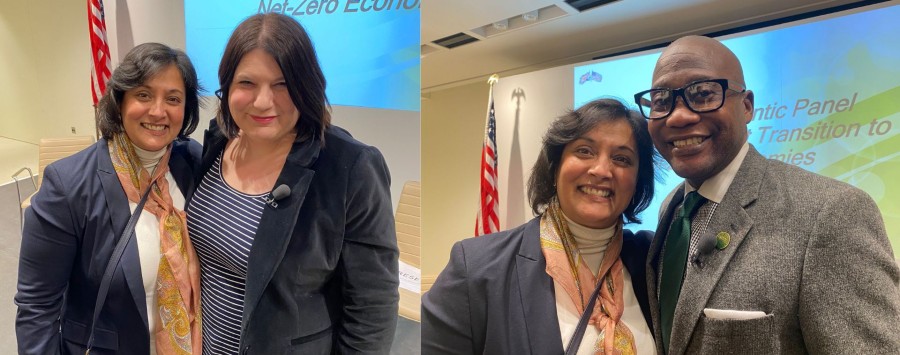Professor Jafry joins mayors for transatlantic just transition debate

Professor Tahseen Jafry shared her climate expertise with mayors from both the UK and the United States at the US Embassy in London yesterday.
Professor Jafry, Director of Glasgow Caledonian University’s Mary Robinson Centre for Climate Justice, attended with Glasgow City Council Leader Susan Aitken, whom she has recently joined on the Council’s advisory group on a just transition to a green economy.
And this was the theme for discussion yesterday. The panel debate brought together sub-national leaders on climate change to share best practices on an equitable and fair transition to net-zero economies and how a transatlantic relationship can work to that end.
The assembled mayors, including Marvin Rees, Mayor of Bristol; Tracy Brabin, Mayor of West Yorkshire; and Errick D. Simmons, Mayor of Greenville, Mississippi, discussed their local initiatives and programmes, and shared best practices, helping to outline a roadmap of practical steps that can address the needs of communities suffering the most acute impacts of climate change.
Professor Jafry said: “Decarbonising our economies is critical to tackling climate change, but also presents a significant economic growth opportunity – creating new industries and jobs that will underpin the future green economy. As the United States and the UK transition to green economies, one significant question is how we will achieve this sustainable growth in an equitable and fair way – ensuring that the poorest are protected. In other words, how can we facilitate a just transition?”
Professor Jafry led the panel to think about some fundamental research questions around how to capture and understand whether just transition policies are making a difference to the livelihoods of those on the brunt of the climate crisis, how to measure that impact and what frameworks can be used.
The audience was made up of transatlantic political leaders, policymakers, academics, think tank representatives, and economists concerned with social justice and climate change.
Professor Jafry added: “Climate policies centred on making our economies sustainable are also working to create a world of new industry and employment. There is an opportunity for millions of new jobs to be created in the transition to net-zero. However, many jobs will also disappear. This wave of restructuring will have unequal effects in many aspects, including regarding skills, gender, age, economic status, and region.
“Greater climate ambition does not necessarily create new inequalities, but concrete policies have distributional effects, and these are often regressive, affecting underrepresented communities the most. There is wide evidence pointing to disproportionate vulnerabilities faced by underrepresented communities, to include black and brown communities around the world due to climate change.”
